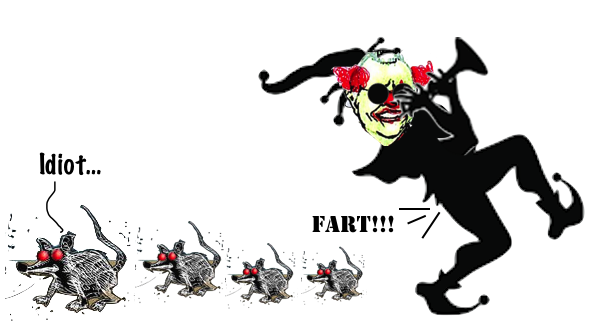Search
Recent comments
- disinformation...
4 hours 5 min ago - poisoned dart?....
7 hours 25 min ago - narrative control....
11 hours 31 min ago - chabad....
16 hours 47 min ago - back to the kitchen....
16 hours 50 min ago - loneliness....
18 hours 59 min ago - insight....
19 hours 30 min ago - conspiracy....
1 day 15 hours ago - brutal USA....
1 day 17 hours ago - men....
1 day 17 hours ago
Democracy Links
Member's Off-site Blogs
the piper's arrogance and complacency...
 fart
fart
The warning to Scott Morrison about a crisis in virus testing was made very clear last year after the Prime Minister told Australians to prepare for a world where they would emerge from lockdowns and live with the coronavirus.
The warning was so loud it was almost impossible to ignore. Almost. Now, only a few months later, voters can see the way Morrison has lost the race to bring in huge supplies of rapid antigen tests when people needed them most.
The government’s twin talents, arrogance and complacency, have been at work again in an astonishing repeat of the slow supply of vaccines last year.
Yet Morrison is not the only one who bears responsibility for the RAT shortage. There was nothing to stop premiers and chief ministers ordering more kits sooner to ease the load on state and territory testing centres.
Employers said last August they needed political leaders to release cheap and easy tests to millions of workers in the same way Britain had done for months, usually free of charge, with an online system to register the results.
“Our Olympic athletes successfully used rapid antigen testing in Tokyo, so why can’t we use the same tests here right now and make them available to all?” Ai Group chief Innes Willox said.
This was not a complaint to Morrison from critics trying to find fault. It was a practical question, not an ideological one. Tony Shepherd, the company director who led the government’s 2014 commission of audit, was urging federal ministers to move fast. Liberal backbenchers, such as paediatrician Katie Allen in the Melbourne seat of Higgins, went public about the need to deploy the rapid tests. Allen had been arguing for more RAT kits since at least June.
This makes the slow response all the more surprising. Politicians hate good advice from their rivals, but the Morrison government was getting good advice from its friends. Its response was that health officials had it all under control. It now turns out they did not.
While Britain and others embraced rapid antigen tests, the Therapeutic Goods Administration was very cautious in Australia. It approved more than a dozen different brands for sale from November 1, but this was months after employers had asked for them and more than a year after Britain cleared its first kits. This might have made sense in the Delta outbreak but was poor planning for future variants – as things turned out when early results showed Omicron was less severe but more transmissible.
Asked in August about rapid antigen tests, chief medical officer Paul Kelly said they should only be used under the supervision of a health professional. The message from Canberra was that it did not want millions of people using RATs to find out for themselves whether they had the virus. Would the government change that approach? “We’re certainly looking at that as a component of our next steps,” Kelly said on August 6. But those steps took forever.
Today, of course, Morrison wants Australians to use RATs at home to keep track of infections, limit the spread and keep people at work whenever possible. He has finally embraced what he was asked to do five months earlier.
As an aside, the testing nightmare should lead to a more thoughtful debate about health advice. The partisan arguments over the pandemic often include calls to respect the health advice and ignore economists or reject calls from business. On testing, the employers were right and the health chiefs were too slow. This week’s decisions prove this point.
It is important to note that the rapid tests are not as precise as PCR tests. Even so, a series of daily RAT results can increase that reliability. That means volume helps. And that is where governments failed.
READ MORE:
https://www.smh.com.au/national/how-scott-morrison-lost-the-rat-race-20220113-p59nwh.html
FREE JULIAN ASSANGE NOW NOW NOW NOW !!!!££££∞∞∞∞¶¶¶!!!
- By Gus Leonisky at 14 Jan 2022 - 5:48am
- Gus Leonisky's blog
- Login or register to post comments
farting around...
As Australians struggle to get hold of a COVID-19 rapid antigen test, several Australian companies have been waiting months for local approval of their RATs.
Key points:Currently, only one of the 22 home tests approved by Australia's Therapeutic Goods Administration (TGA) is made locally, with 16 sourced from China, two from the US and the others from Korea, Singapore and Germany.
However, with the global Omicron wave seeing surging demand for RATs around the world, there are concerns Australia's current supply shortage could be exacerbated if planned shipments are diverted elsewhere.
In particular, with the vast bulk of Australia's tests coming from China, a worsening Omicron outbreak there could further threaten supply if tests bound for export were requisitioned by the Chinese government.
Several Australian companies have developed COVID RATs locally, although at least two are waiting on TGA approval for tests that are already in use in Europe or North America.
Brisbane-based AnteoTech is one of those.
Its chief executive Derek, Thomson, told the ABC that a lack of supply was inevitable during major waves of new COVID variants such as Delta and Omicron without much earlier planning and investment by Australian governments.
Read more:
https://www.abc.net.au/news/2022-01-14/australian-made-rats-await-approval-amid-test-shortage/100754808
FREE JULIAN ASSANGE NOW....!!!√√√√